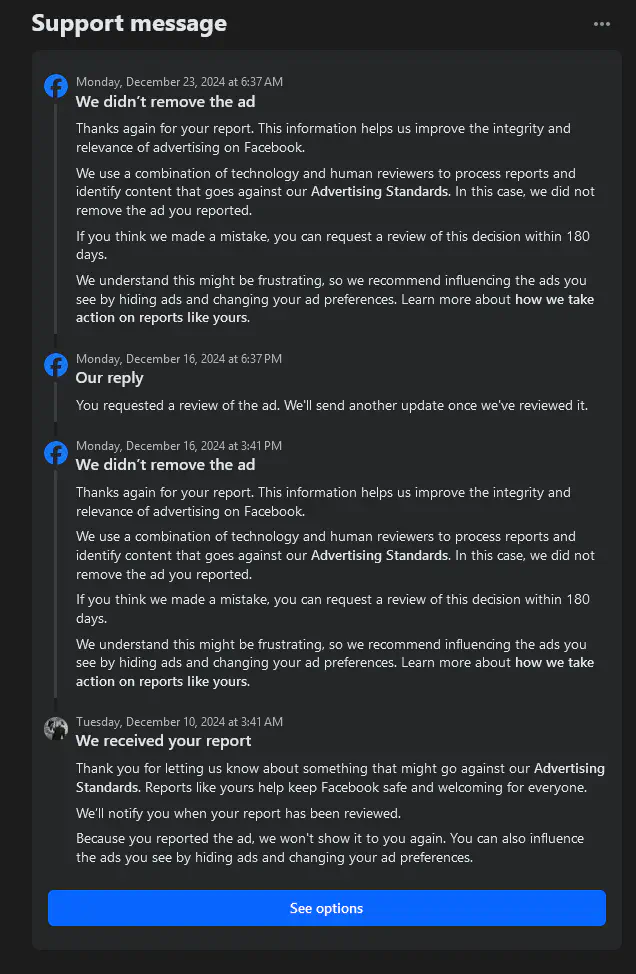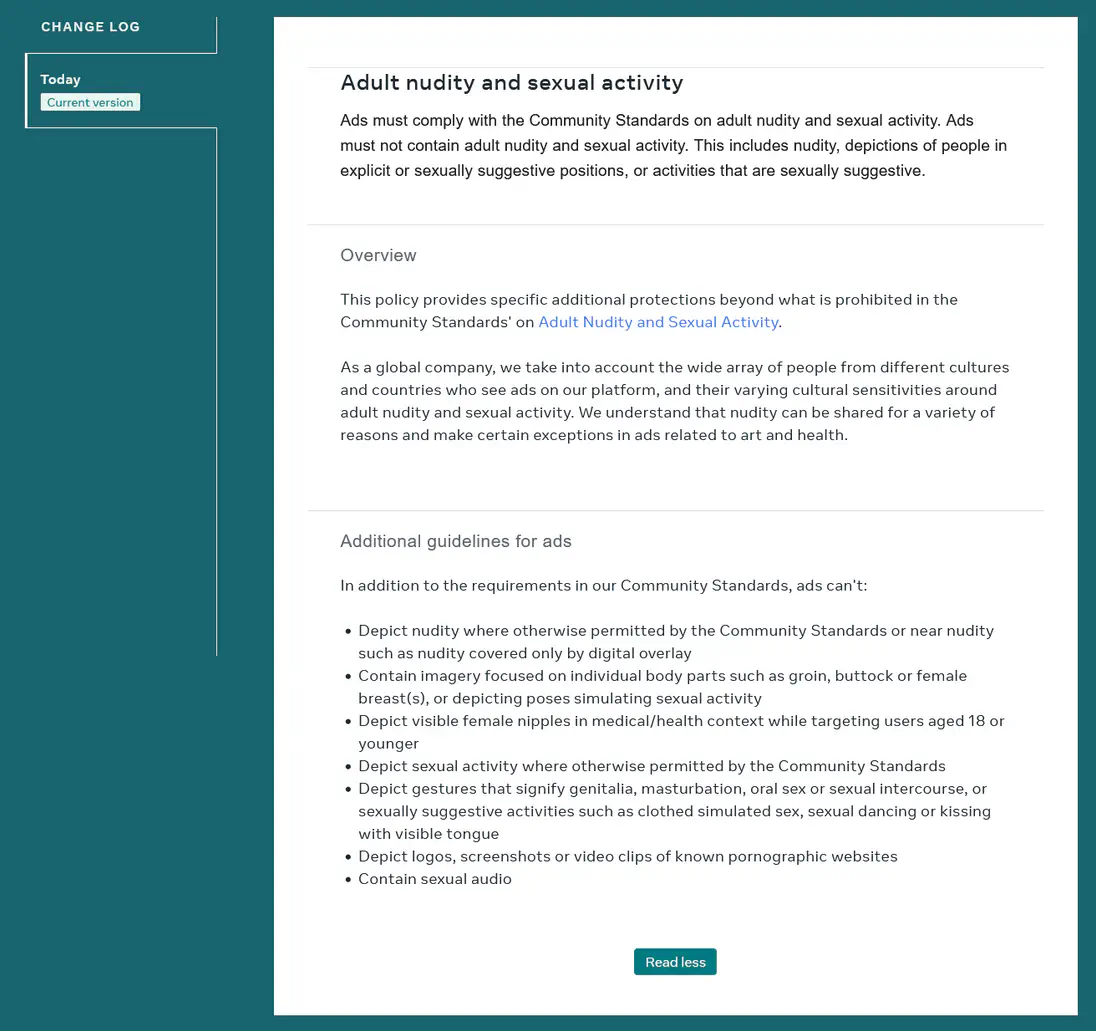Time to leave the facebook, and why I think you should too.
If you weren’t already aware, with the rise of OpenAI API-powered bots, the slow poisoning of your news feed with groups and pages you don’t even care about, and a rise in vitriol from regular commenters (boomers); now is probably the best time to leave Facebook.
Recently, Facebook’s parent company, Meta, who also owns Instagram and Threads, decided to do away with their censorship and fact-checking team. This decision has significant implications, as these teams played a crucial role in curbing the spread of misinformation and harmful content. Without them, the platform risks becoming an even larger breeding ground for unchecked falsehoods and polarizing narratives, further eroding the quality of discourse and user trust.
404 Media, which is an independent media company, recently put out an article about the elimination of the censorship and fact-checking team, which is pretty much joined to the moderation team, I suppose. And I’ve had my own issues with Facebook or Meta’s moderation policies or processes in the past.
It was only recently that I was scrolling through Facebook on my mobile phone, I think it may have been about two months ago, and was met with an ad that—like most ads on Facebook now—was absolute junk, either pushing crypto or pornography or something along those lines. But this ad was pushing some Viagra or penis enlargement product. While it was a cartoon, it depicted an adult man shoving his now enlarged penis in the face of a young child.

Naturally, I did what I think most people would do, which is report the ad and ask, “Why am I seeing this?” It was a few days later that I got an automated response from the moderation system, where they said that they found nothing wrong with the ad.
The process was frustrating to say the least. I would throw it back at them, and received three separate responses over the course of two weeks. Each one essentially dismissed my report, a final supposedly human review stated that the ad didn’t violate their advertising standards. The final response even suggested I manage my ad preferences to “influence the ads I see” as if this grotesque content was my choice.
What makes this even more egregious is Meta’s own guidelines for ads. According to their advertising standards page, they explicitly prohibit depictions of sexual activity, gestures that signify genitalia, or content that involves nudity, even in cartoons. The very ad I reported blatantly violated these rules. Yet somehow, their system, both automated and human-reviewed, let it slide.

It’s one thing to have rules; it’s another to enforce them consistently. This blatant disregard for their own guidelines was one of the final straws for me in deciding to leave Facebook for good.
The 404 Media article that I mentioned earlier highlights this as well. They pointed out that an ad is far less likely to be taken down if the person or entity is a paid sponsor, rather than just casually uploading content as a page without payment. Their investigation revealed that a single individual or company had published over eight hundred of these types of ads, all depicting sexual imagery, genitalia, or even, in some cases, non-consensual pornography or revenge imagery. This blatant prioritization of ad revenue over enforcing community standards further illustrates the deeply flawed system at Meta.
I don’t take issue with the recent news that you can now hop on Facebook and say that people from the LGBTQ community are mentally ill, or that gender transition and related topics are extreme or misguided ideas (all notions which I wholeheartedly resent, where I actively support the community in their pursuit of happiness; but I am always open to seeing morons out themselves in public so I can hit them with the block button). That friction is a proponent of open speech, as is the block button which has always been there. My issue is that using the block button or the “I want to see less of this” function doesn’t actually seem to do anything in terms of sanitising your feed. For example, I’ve repeatedly blocked certain types of ads, only to see similar ones reappear within days. Similarly, pages or topics I’ve marked as “uninteresting” continue to populate my feed, showing a clear failure in how these tools are implemented. The tools designed to give users control over their experience seem broken or ineffective, leaving people stuck with content they actively try to avoid.
It’s genuinely disheartening to realise that Facebook, a platform that has been a significant part of my life for so long, has come to this point. I first made an account in 2008 and went through a lot of friendships and relationships that were established over Facebook Messenger. To now look at this and say, “Hey, this is what it has come to” is pretty shit.
I’m actively making exports of messages and data in preparation for the day I might just delete my account randomly and leave it all behind.
While I was never the most active user, I’ve already stopped using Twitter entirely, and it actively disgusts me that a lot of people, especially in the wrestling community, continue to use the Twitter platform. The header on my profile now says, “I’m not posting on here anymore.” I haven’t deleted my Twitter account because there is some emotional baggage there in terms of interacting with people that I like and want to support. But in terms of actually contributing through the platform, it’s not something that I can participate in any more of good conscience.
Maybe there’s an open source tool that will let me mirror my interactions to BlueSky?
While alternatives like BlueSky have popped up in terms of providing a cool new haven for creatives and for posters to flock to, my concern is that BlueSky was a product that Twitter itself had spun up and is still somewhat independently funded by them, if I remember correctly. And even with the decentralized nature of something like BlueSky, the problem is that the majority of servers are run by BlueSky itself, which undermines the platform’s decentralized ideals. This centralized control means that while users might benefit from decentralization in theory, the actual implementation leaves BlueSky as the de facto gatekeeper. Without a broader community taking on the effort of hosting their own servers, the platform risks becoming no different than its centralized competitors. No one is spinning up their own server or their own instance because of the effort involved or because of the technical hurdle. It’s not really something that you’d do unless you’re an enthusiast of some platform.
I recently started up this blog about two years ago (I guess recent is a two-year duration in my mind). I remember someone making fun of me, saying, “Oh, are blogs really still a thing?” (I’m looking at you, Josh), The thing with a blog is that I can control the content that goes up on the site. I can control the comments if I choose to enable them. It’s all hosted in a way where I control every aspect of communication and ownership of the work.
Maybe it’s time to revert back to things like email and text messaging. There’s obviously going to be a period of transition where I’m going to feel anxious not knowing what people are doing or not feeling like I’m in the know, which I guess is just a product of how deeply integrated many other people are with social media platforms.